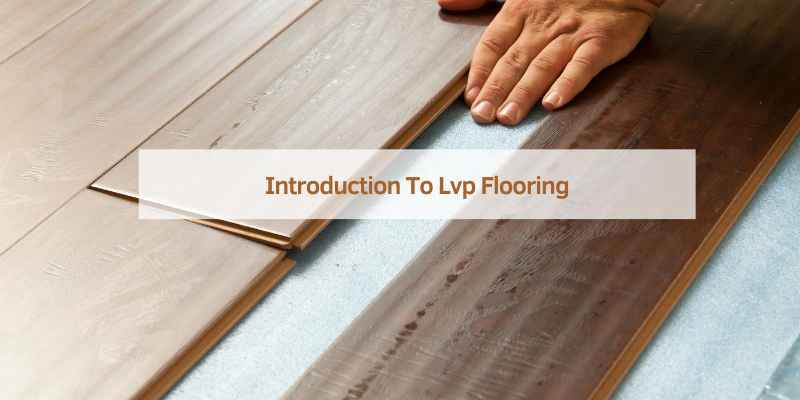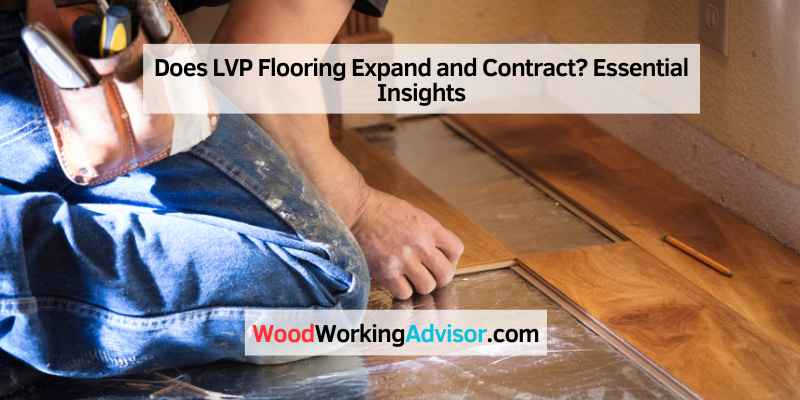Yes, LVP flooring expands and contracts. Temperature and humidity changes cause this movement.
Luxury Vinyl Plank (LVP) flooring is a popular choice due to its durability and aesthetic appeal. This type of flooring mimics the look of hardwood but offers greater resistance to moisture and wear. Despite its many advantages, LVP flooring is subject to expansion and contraction.
These changes are primarily driven by fluctuations in temperature and humidity levels. To ensure longevity and performance, proper installation and acclimatization are crucial. Installing LVP flooring with appropriate gaps and allowing it to adjust to room conditions can mitigate issues related to expansion and contraction. This proactive approach helps maintain the flooring’s integrity and appearance over time.
Introduction To Lvp Flooring
LVP flooring, known for its durability and aesthetic appeal, can expand and contract with temperature fluctuations. Proper installation and acclimatization minimize these effects, ensuring a long-lasting and stable floor.
The Popularity Of Luxury Vinyl Plank
Luxury Vinyl Plank, or LVP, is very popular today. Many people choose LVP for their homes. It looks like real wood but costs less. It is also very easy to clean. LVP is also water-resistant, which is great for bathrooms and kitchens. Many people love the look and feel of LVP flooring.
Basics Of Lvp Composition
LVP is made of several layers. The top layer is clear and protects the floor. Underneath, there is a design layer that looks like wood. The core layer gives the plank strength. The bottom layer adds stability. These layers make LVP durable and long-lasting.

Thermal Properties Of Lvp
LVP flooring can expand and contract due to temperature changes. Proper installation and acclimation help minimize these effects. Ideal for various climates, LVP remains a popular choice for its durability and aesthetic appeal.
Heat Sensitivity
LVP flooring can be sensitive to heat. Direct sunlight or high temperatures can cause the flooring to expand. This expansion may lead to buckling or gaps. It’s important to use window coverings to block sunlight. Keeping the indoor temperature stable can help too.
Effect Of Temperature Fluctuations
Temperature changes can cause LVP flooring to contract. Cold temperatures may make the flooring shrink. This could create small gaps between the planks. Keeping the room at a steady temperature helps prevent this. Using rugs and proper insulation can also help.
Expansion And Contraction In Lvp
Luxury Vinyl Plank (LVP) flooring can expand and contract with temperature changes. Proper installation and acclimation help minimize these effects. Ensuring a stable environment reduces potential issues.
The Science Behind Material Movement
LVP flooring expands and contracts with changes in temperature and humidity. Heat makes the material expand. Cold makes it contract. The flooring is made of vinyl, which is flexible. Vinyl reacts to the environment. The planks can shift slightly. This is normal behavior for LVP flooring. It is important to leave space for expansion. Installers call this an expansion gap. This gap allows the flooring to move. Without it, the flooring could buckle.
Common Causes Of Expansion
Direct sunlight can cause expansion. Rooms with large windows get more sun. Heating vents can also affect the flooring. The planks near vents may expand more. Humidity levels play a big role. High humidity makes the flooring swell. Spills left on the floor can also cause expansion. Proper installation and maintenance help control these issues.
Signs Of Lvp Movement
LVP flooring can expand and contract due to temperature and humidity changes. Gaps or buckling may indicate movement issues. Proper installation and climate control help minimize these effects.
Visual Indicators
Gaps between planks can be a sign of movement. Buckling is another common indicator. Wavy or uneven surfaces also show expansion or contraction. Raised edges may appear around the room’s perimeter. Discoloration in some areas can occur. Visible seams might become more noticeable over time.
Physical Sensations
Feeling soft spots underfoot can indicate movement. Uneven or bumpy areas may be felt while walking. Creaking sounds can be heard when stepping on certain planks. Temperature changes in the room can affect the floor feel. Increased noise when walking might be noticed.
Preventing Excessive Movement
Lvp flooring needs careful installation. This helps to reduce movement. Use spacers to create gaps around the edges. These gaps let the floor expand. Follow the manufacturer’s instructions. This ensures the floor stays in place. Click-lock systems are good for stability. They help prevent shifting. Make sure the subfloor is clean and flat. Any bumps can cause issues. Proper installation keeps the floor looking great.
Keep indoor temperature steady. This helps reduce floor movement. Extreme heat or cold can cause problems. Use air conditioning in summer. Use heating in winter. Humidity can also affect the floor. Dehumidifiers help control moisture. Keep humidity levels between 30% and 50%. This is best for the floor. Climate control keeps the floor stable.
Seasonal Changes And Lvp Behavior
LVP flooring responds to seasonal changes by expanding and contracting. Temperature and humidity fluctuations influence its behavior. Proper installation minimizes noticeable effects.
Winter Vs. Summer Effects
LVP flooring can expand and contract with seasonal changes. During winter, the cold air makes LVP flooring contract. In summer, warm air makes LVP flooring expand. This change is because of the temperature and humidity. Rooms with heaters or air conditioners may show less change. But, without proper care, gaps or buckling can happen.
Mitigating Seasonal Impact
To reduce seasonal changes, keep the room temperature stable. Use humidifiers in winter to add moisture. This helps the flooring stay the same size. In summer, use dehumidifiers to remove extra moisture. Proper installation also helps. Leave small gaps at the edges. These gaps allow the flooring to move without damage. Regular maintenance keeps LVP flooring looking great all year.
Longevity And Maintenance Of Lvp
Regular sweeping keeps dust and dirt away. Use a soft broom. For a deeper clean, use a damp mop. Avoid soaking the floor with water. Dry the floor quickly after mopping. Spills should be wiped up fast. This prevents stains and damage. Use rugs or mats at doorways. This reduces dirt tracking. Keep pet nails trimmed to prevent scratches. Use furniture pads under heavy items. This protects the floor from dents.
LVP floors can expand and contract with temperature. Leave a small gap around the room edges. This gap allows for movement. Use molding or trim to cover the gaps. Avoid extreme temperatures in the room. Keep the temperature steady for the best results. Acclimate the planks before installation. Let them sit in the room for 48 hours. This helps them adjust to the room’s conditions.
Choosing The Right Lvp For Your Space
Quality is important for LVP flooring. Look for thicker wear layers. Thicker layers are more durable. Specifications matter too. Check for warranty details. Better warranties mean better quality. Always read product reviews. Reviews give real user experiences.
LVP flooring reacts to temperature. It can expand and contract. Keep this in mind when installing. Leave space for expansion. This prevents damage. Humidity also affects LVP. Too much moisture is bad. Use dehumidifiers in damp areas. This will protect your flooring. Proper installation is key. Follow manufacturer guidelines carefully.
Professional Insights
LVP flooring expands and contracts due to temperature and humidity changes. Proper installation and acclimation minimize these effects. Regular maintenance ensures longevity and performance.
Expert Installation Advice
Proper installation is crucial for LVP flooring. Floors must be installed in a stable environment. Ensure the room temperature is consistent. This helps prevent expansion and contraction.
Acclimate the flooring before installation. Leave it in the room for 48 hours. This step is very important. It helps the flooring adjust to the room’s climate.
When To Consult A Specialist
Consult a specialist for large installations. Experts understand the best practices. They use professional tools. This ensures a perfect fit. DIY installations may lead to mistakes. These mistakes can cause gaps or buckling.
Seek professional help if the subfloor is uneven. Experts know how to level the subfloor. This prevents future problems. Professional help ensures a long-lasting floor.

Frequently Asked Questions
Does Vinyl Plank Flooring Really Expand?
Yes, vinyl plank flooring can expand. Temperature and humidity changes cause this expansion. Proper installation allows room for this movement.
Does Lvp Expand In The Summer?
Yes, LVP (Luxury Vinyl Plank) can expand in the summer. High temperatures and humidity may cause slight expansion. Ensure proper acclimation and installation to minimize issues.
Do Lvp Floors Need To Settle?
Yes, LVP floors need to settle. Let them acclimate for 48 hours before installation. This ensures proper alignment and stability.
What Flooring Does Not Expand And Contract?
Ceramic and porcelain tiles do not expand and contract. They are stable and highly resistant to temperature changes.
Conclusion
LVP flooring does expand and contract with temperature and humidity changes. Proper installation is crucial to accommodate this. Use spacers and maintain a consistent environment. This will ensure your flooring remains beautiful and functional for years. By understanding these factors, you can make informed decisions for your home.


